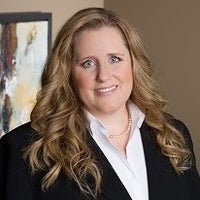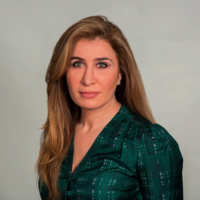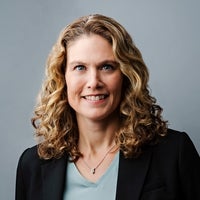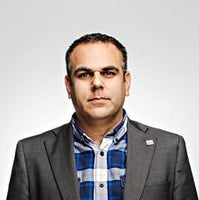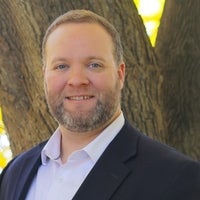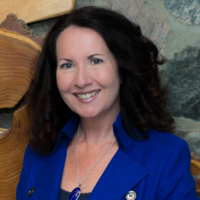
In support of good governance practices, this Manual serves as a key reference to the Board of Governors. It is a compilation of governance procedures, roles, responsibilities resource materials.
The appendices contain information that outlines the administrative structures and operational management in place to ensure the University achieves its goals within the approved strategic framework.
Governance is the structures, policies and processes that direct, control and hold an organization to account. Knowledgeable and competent Governors with a clear understanding of their role and a strong commitment to carrying out their respective responsibilities help make the structures of an institution effective.
The information in this Manual has been compiled for ease of reference. The Secretariat remains the repository for the official version of key documents in the University of Waterloo’s governance framework.
1. Bicameral Governance
The University is an entity created by statute – University of Waterloo Act, 1972 (the “Act”). From that statute it derives its authority and its governance structure. Waterloo, like most universities, has a bicameral structure, meaning that it has two legislative bodies: a Board of Governors (the “Board”) and a Senate.
The University of Waterloo objects are “the pursuit of learning through scholarship, teaching and research within a spirit of free enquiry and expression.” (UW Act, Article 3)
The Act:
- Specifies the composition of both bodies;
- Sets out the responsibilities and powers of each;
- Provides for links between the two; and
- Provides for their membership, approval authorities and advisory capacity.
The Board is responsible for “the government of the University and the control of its property and revenues, the conduct of its business and affairs, save with respect to such matters as are assigned by this Act to the Senate.” (UW Act, Article 14). The Board’s role is one of stewardship, within a bicameral governance structure, for the purpose of ensuring the University fulfills its objects which are “the pursuit of learning through scholarship, teaching and research within a spirit of free enquiry and expression.”
The Board and Senate each has its own focus and the work of each is fundamental to the functioning of the University.
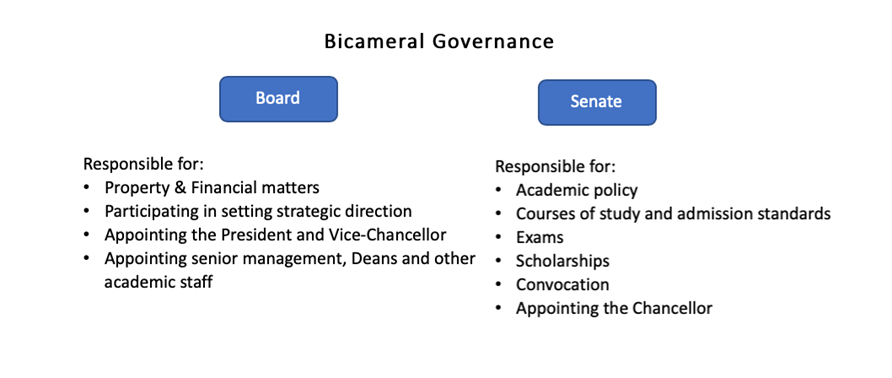
Some proposals come forward to both bodies for approval but with respect to different aspects or may flow from one body to the other for approval or information. The Act sets out certain items that are within the authority of the Board but on which Senate either provides advice to the Board or recommends to the Board.
Senate provides advice to the Board on:
- Annual Operating budgets (including Tuition Fees); and
- Administrative policies that are in the Board’s domain but that affect teaching, learning, and research environments.
Senate provides advice and recommendations to the Board in respect of:
- Establishment of termination of academic units
- Establishment of chairs, scholarships, fellowships, bursaries
- Affiliation with other institutions
- Long-range strategic and campus plans
- Appointment of Deans
- Appointment of Vice-President, Research & International
- Appointment of Vice President Academic & Provost
- Appointment of the President and Vice-Chancellor
Jump to:
-
-
Role and Responsibilities: Individual Governors
-
Role and Responsibilities: Board Chair
-
Role and Responsibilities: Vice-Chair
-
Role and Responsibilities: Chancellor
-
-
Committees of the Board of Governors
-
Role and Responsibilities: Committee Chairs
-
Standing Committees of the Board
-
-
-
Annual Meeting Schedule
-
Meetings and Attendance
-
-
-
Provincial Context - Responsible Ministry
-
Broader Public Sector Accountability Act
-
Strategic Mandate Agreements
-
University Funds - Overview
-
University Administration
-
Overview of Faculties
-
Affiliated and Federated Institution of Waterloo
-
University of Waterloo Campuses
-
2. Good Governance
Good governance requires a strong relationship, honest dialogue and mutual respect. Governors, Senators and Administration all play an important role in how the University operates.
Strong relationship – Board, Senate and Administration understand their roles and responsibilities.
It is key that the Board does not get into the operational level but maintains a strategic perspective. Governors should focus on “what” is being done, more than on “how” it is being done from a day-to-day operational standpoint. “How” things are being done can be addressed by looking at the overall culture of the organization, rather than in the details of the day-to-day operations.
Honest Dialogue – Board and Senate provide constructive feedback and guidance and Administration is open and transparent regarding management challenges
Mutual Respect – Trust among Board, Senate and Administration
3. Communications
The University communicates with a wide range of internal and external stakeholders, which are in part reflected in the membership of the Board. Members vote in favour, in opposition or in abstention on matters requiring decision by the Board. However, once the Board has decided, each Board member is obligated to stand by that decision, regardless of their individual beliefs.
3.1 Speaking on Behalf of the Board of Governors
The President or their designate is the spokesperson for the University. The Chair of the Board is the spokesperson for the Board and, in this regard, the Chair consults with the President with respect to Board communiques.
3.2 Letters to the Board of Governors
Letters addressed to the Board of Governors are forwarded immediately on receipt to the Board Chair. The University Secretary may, at their discretion, refer letters that have been inappropriately addressed to the appropriate person or authority. If Governors receive correspondence addressed to the the Board or regarding the work of the Board, they should forward it to the University Secretary and, if sensitive, directly to the Board Chair.
4. Governing Documents
The Board is clearly and collectively responsible for the institutional mission and strategy of the University and has an obligation to conduct itself with the highest regard to protecting the institution’s reputation. To support the Board’s work, there must be clear policies and procedures which adhere to legislative and regulatory requirements.
4.1 Bylaws
The Act provides the authority to the Board and Senate to enact bylaws to aid in the governance and functioning of the respective body. Bylaws are a set of internal rules that govern how a body is run. As leadership of these bodies change, these bylaws remain the constant reference for consistent governing. The Board and Senate each have their own Bylaws.
Additional Resources
Board Bylaw 1
Senate Bylaws
4.2 Board Mandate
In addition to the Bylaws, the Board has developed a Board Mandate which outlines key accountabilities in several key areas including:
- Governance and Board Stewardship (oversight delegated to the Governance Committee)
- Leadership and Human Capital
- Strategic Direction and Plans
- Risk Management (oversight delegated to the Audit & Risk Committee)
- Finance, Controls and Capital Management (certain oversight has been delegated to the Audit & Risk Committee, the Finance & Investment Committee and the Building & Properties Committee)
Certain activities and responsibilities may be delegated to Committees.
Additional Resources
Board Mandate
4.3 Signing Authority and Resolutions
The Board is responsible to approve an overall framework for delegations of spending, signing and borrowing authorities. The Signing Committee of the Board has the power to designate or appoint signing officers on behalf of the University as the Committee deems expedient and advisable. The President and the Chair of the Board constitute the Signing Committee.
Signing Resolutions
Contracts Agreement and Expenses – Excluding Research
Applications, Proposals, Contracts, Agreements, and Licenses - Research
University of Waterloo Pension Plan and Benefit Plans
General Financial Services
Investments
Contracts and Agreements – Zero or Unspecified Dollar Amount
4.4 Policies and Guidelines
The Secretariat maintains the library of institutional policies and supports committees and administration in the process of development and renewal. Depending on the nature of the policy, the process for development, amendment and approval is defined by the class of policy.
University policies become operational upon approval:
- By the Board of Governors, or
- By University Officers under authority delegated by the Board of Governors, or
- By the Senate of in the case of academic policies dealing with educational or academic matters.
Additional Resources
Institutional Policies and Guidelines
5. Membership
Effective boards are created by bringing together a diverse group of committed individuals with knowledge, interest, skills, and experience relevant to the needs of the board. The value derived from the combination of succession planning with equity, diversity, and inclusion cannot be overstated.
5.1 Composition of the Board and Senate
The composition of the Board and Senate is set out in the Act. The Board has 36 voting members, 58% of whom are “external” members. The Senate has 92 voting members, 90% of whom are “internal”. The Act gives Senate the power to add additional mmembers of Senate as long as the members of faculty always equal one more than the total number of all other members of Senate.
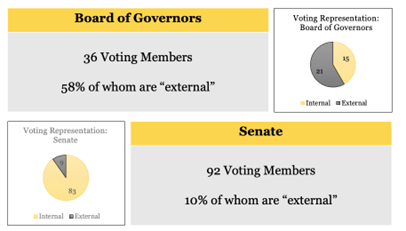
Board Composition:
- Ex officio – 5
- Community-at-Large – 10
- Lieutenant Governor in Council – 7
- Faculty appointed by Senate – 7
- Students – 4
- Administrative Staff – 2
Senate Composition:
- Faculty – 47
- Students – 12 students
- Alumni – 4
- Ex officio – 26
- Board of Governors – 3
Additional Resources
Current membership of Board
Current membership of Senate
2023-2024 Board of Governor Biographies
5.2 Board Renewal and Succession
Board Bylaw 1 requires that one of the standing committees of the Board has responsibility for nominations and that responsibility is assigned to the Governance Committee. While the Board does not select every individual, it is responsible for ensuring that collectively, the Board has the right mix of skills, experience, and diversity to meet the current and future needs of the Board. The Governance Committee relies on the Board Renewal and Succession Policy to proactively plan for Board member succession and renewal.
Additional Resources
Board Bylaw 1
Board Mandate
Board Renewal and Succession Policy
5.3 Assessment of Board and Committee Performance
The Board, through the Governance Committee, leads periodic reviews of governance best-practice standards and leads an annual evaluation exercise to survey the Board on Board and Committee effectiveness. The results of the survey are shared with the Board and the University Secretary collaborates with Administration to address areas of opportunity.
6. Duties and Liabilities
6.1 Duties of Governors
The Board manages the property, revenue, business and affairs of the University as set out in the Act. All Governors and officers are subject to the duties and standard of care that are required under the Act and at common law.
6.1.1 Fiduciary Duty
Fiduciary duty requires a Governor to act honestly and in good faith with a view to the best interest of the University.
A fiduciary duty is an obligation of one party to act in the best interest of another. It speaks to concepts such as: the duty of confidentiality, conflict of interest, the duty to disclosure certain information, and the appropriateness of an opportunity (taking an opportunity for yourself that you’ve learned about through your role as a governor).
Although Governors are appointed from various constituencies and bring valuable perspectives – when decisions are being taken you need to consider what is in the best interests of the University not the best interests of your constituency.
6.1.2 Duty of Care
Duty of care requires a Governor to exercise the care and skill of a reasonably prudent person: obtaining the appropriate information, reviewing information critically; and probing analysis and recommendations provided by Administration and advisors carefully.
You can exercise this duty by being well-prepared for meetings, reviewing materials thoroughly, being curious and engaging in discussions at Board and committee meetings, and applying your own skills, knowledge and judgment to decisions the Board is called on to make.
Governors with questions on the materials should contact the University Secretary who will follow up with Administration.
6.1.3 Statutory Liabilities
Statutory liabilities are obligations under employment, environmental and financial reporting law as well as under the withholding provisions of taxation law. Examples include requirements to ensure payroll deductions are made, taxes are paid, and obligations to employees such as pensions are met.
6.1.4 Business Judgment Rule
The business judgment rule shields the decisions of Governors from judicial second-guessing if those decisions were made honestly, prudently, in good faith and on reasonable grounds. The obligation of Governors is to make a reasonable decision, not a perfect one.
The Board is responsible to ensure there is a reasonable system in place for informing and reporting, and that it is monitored and maintained.
The University carries Directors’ and Officers’ Liability insurance to provide financial protection to Board members who may become subject to liability despite having acted in accordance with their fiduciary duty and duty of care.
6.1.5 Inclusive Board Culture
Governors are responsible for actively building relationships and contributing to building an inclusive Board culture. As a volunteer to the University, governors have certain rights, obligations, and responsibilities further to the Accessibility for Ontarians with Disabilities Act (AODA), the Ontario Human Rights Code (OHRC) and the University’s EDI-R commitments.
In addition, bringing EDI to life requires attention to three key dimensions:
- Your own EDI as a board – whether the board’s composition and inclusion practices are reflective of strong EDI
- Your specific oversight of EDI inside the organization – how you ensure EDI is embedded throughout the organization
- The way you bring EDI to life and bring a lens of EDI to all of the board’s work – the way EDI considerations are brought to every conversation, even if not explicitly about EDI
AdditionalResources
Office of Equity, Diversity, Inclusion and Anti-Racism
7. Academic Freedom and Ethical Behaviour
7.1 Freedom of Expression
The University of Waterloo objects are “the pursuit of learning through scholarship, teaching and research within a spirit of free enquiry and expression.” Members of the University enjoy certain rights and privileges essential to the fulfilling of those functions.
Central among these rights is the freedom, within the law, to pursue certain areas of inquiry, to teach and to learn unhindered by external or non-academic constraints, and to engage in full and unrestricted consideration of any opinion.
This freedom extends to all members of the University and to visitors who participate in such inquiry or discussions on University property and at University events without undue interference. Suppression of this freedom, would prevent the University from carrying out its primary functions.
Behaviour that obstructs free and full discussion, not only of ideas that are accepted, but of those which may be unpopular or even abhorrent, vitally threatens the integrity of the University’s forum.
In 2019, the Ontario government mandated that colleges and universities develop, implement and comply with a free speech policy.
Institutions are required to submit to the Higher Education Quality Council of Ontario annual reports detailing the implementation of their free speech policies. HEQCO reviews each institutional annual report and produces a public report that assesses compliance.
Additional Resources
Policy 8 – Free Speech Policy and Annual Reports
7.2 Ethical Behaviour
The University of Waterloo is committed to providing an environment that supports and reward its members. As required by the Ontario Human Rights Code and the Occupational Health and Safety Act, the University has a responsibility to provide an environment free from harassment and discrimination and must deal effectively and fairly with any situation involving claims of harassment or discrimination that come to its attention. This applies to Governors as volunteers and visitors to the University.
Additional Resources
Policy 33 – Ethical Behaviour
Office of Equity, Diversity, Inclusion and Anti-Racism
7.3 Equity, Diversity, Inclusion and Anti-Racism
The goal at the University of Waterloo is to ingrain anti-racism in the fabric of our society, in our classrooms, boardrooms, and in every facet of university life. The President’s Anti-Racism Report includes many recommendations to support that goal as we progress towards ending systemic racism at the University.
Additional Resources
President’s Anti-Racism Taskforce
7.4 Conflict of Interest and Disclosure Requirements
The University of Waterloo obligates its members and officers acting on its behalf to avoid ethical, legal, financial or other conflicts of interest which may impede or compromise their university responsibilities or the mission of the institution.
Each Governor should avoid, whenever possible, any situation in which there is an actual, potential, or perceived conflict of interest, which could interfere with the Governor’s judgment in making decisions in the University’s best interest.
A conflict of interest is a situation in which the private interests of a Governor conflict, potentially conflict or appear to conflict directly or indirectly with their duties to the University, including their duty to act in the best interests of the University.
An actual conflict of interest exists where a Governor exercises an official power or performs an official duty, at the same time knowing that, in exercise of such performance, there is the opportunity to further a private interest.
A potential conflict of interest exists where there is some private interest that could influence the performance of a Governor’s duty or function or the exercise of power but have not yet exercised that duty or function.
A perceived conflict of interest exists where informed people might reasonably hold the apprehension that a conflict of interest exists on the part of the Governor.
Every newly elected/appointed Governor and re-elected/re-appointed Governor must complete and submit a Conflict of Interest Declaration to the Secretary of the Board upon appointment/re-appointment and annually thereafter.
In addition to filing a Conflict of Interest Declaration, all Governors have an ongoing duty to disclose an actual, perceived or potential conflict of interest as soon as the issue arises and before the Board or its committees deal with the matter. Please review to the Conflict of Interest FAQ’s for examples and guidance.
The University Secretary remains a resource for any questions regarding a real, perceived or potential conflict of interest.
Additional Resources
Conflict of Interest – FAQ’s
Conflict of Interest Disclosure Form
8. Responsibilities of Governors
8.1 Role and Responsibilities: Individual Governors
Governors oversee the affairs of the University as described in the Board Mandate. In carrying out their responsibilities, Governors are expected to be actively engaged in the Board’s work. This applies to all Governors (elected, appointed, ex officio). Governors also have rights and responsibilities guided by various policies, regulations and legislation which apply as volunteers and visitors to the University.
Governors are expected to:
- Be knowledgeable about the mission, vision, and strategic direction of the University
- Maintain confidentiality requirements and declare conflicts of interest (real and perceived)
- Develop an understanding of the roles, responsibilities, and legal duties of a Governor, and the governance structure of the University
- Apply their skills and knowledge to make decisions in the best interests of the University as a whole
- Support Board decisions and speak with one voice once a decision has been made
- Actively participate in Board-related matters and contribute to discussions
- Be available and dedicate time to the role, including to attend and be prepared for meetingsand be informed on relevant issues through pre-reading information packages and otherwise
- Seek permission from the Board in advance for attending less than 50% of Board meetings in any given year by notifying the University Secretary and Board Chair with an explanation for the absences, in order to remain on the Board
- Participate in Committees where appointed and become knowledgeable about the purpose and responsibilities of that Committee
- Devote time and participate in Board and Governor orientation, development, education programs and workshops, and Board evaluation processes
Governors serve the following terms:
- Members of faculty: two years
- Student members: two years
- Members of full-time staff: three years
- Community-at-large members: three years
- Lieutenant Governor in Council members: three years
- Ex officio member: no term limit (appointed by virtue of their office and named in the University of Waterloo Act)
After serving a full term, Governors are eligible for re-election or reappointment for a second consecutive full term; and eligible again one year following the completion of two consecutive terms.
Governors may serve partial or incomplete terms from time to time which do not count towards their two term limit.
Additional Resources
Governor Role Description
8.2 Role and Responsibilities: Board Chair
The Board Chair provides leadership to the Board, guiding the Board to fulfill stewardship responsibilities and supporting a culture of active and constructive Board engagement. They serve as the primary spokesperson for the Board, and as a direct liaison between the Board and the President.
The Board Chair:
- Provides overall leadership to the Board and supports the Board in fulfilling governance responsibilities
- Takes a leadership role in developing and reviewing the Board agenda, chairs Board meetings and facilitates discussion
- Chairs the Governance Committee, the Board Executive Committee, Presidential x search committee, Presidential review committee and is a member of the Signing Committee; is an ex officio member of all other Committees
- Works with the President and University Secretary to ensure coordination and alignment of work across the Board and Committees, and with the Board’s annual work plan
- Ensures, in coordination with the Governance Committee, that there are robust succession planning processes to recruit, select, and onboard new Governors
- Is the primary spokesperson for the Board and represents the Board at University and University community functions and activities
- Leads the evaluation of the Secretary with the President to ensure that governance processes are carried out appropriately and that they support independent, informed decision-making
The Board Chair is selected from among the community-at-large members of the Board of Governors to serve a three-year term. A Chair may be re-elected to one additional term. For the sake of clarity, neither election as Chair nor re-election as Chair may extend the maximum term of a Governor.
Additional Resources
Board Chair Role Description
8.3 Role and Responsibilities: Vice Chair
The Vice-Chair acts as a support and resource to the Chair and the Board, including to fulfill the Chair’s role in their absence and to act as a sounding board for the Chair.
The Vice-Chair:
- Assists the Chair, as appropriate, in fulling responsibilities for Board stewardship and meetings, whether in the broadest sense or as may be specifically assigned
- Is available to and acts as a sounding board for the Chair
- Acts as an additional key point of contact with the President in the Chair’s absence or incapacity
- Presides at all meetings of the Board in the Chair’s absence and undertakes the responsibilities of the Chair when the Chair is absent or unable to serve as Chair
- In partnership with the Chair, co-leads the President evaluation process
- Undertakes special projects, initiatives, or functions which may be requested by the Chair or Board, from time to time
The Vice Chair is selected from among the community-at-large members of the Board to serve a three-year term. A Vice Chair may be re-elected to one additional term. For the sake of clarity, neither election as Vice Chair nor re-election as Vice Chair may extend the maximum term of a Governor.
Additional Resources
Vice-Chair Role Description
8.4 Role and Responsibilities: Chancellor
The Chancellor is the ceremonial head of the University, presiding over convocation and conferring all degrees. The Chancellor is a voluntary position that represents the University in the broader community, acts as University ambassador, and serves as an ex-officio member of the Board and Senate.
A Chancellor Nominating Committee is formed to seek and consider nominations for the office of Chancellor. The Chancellor Nominating Committee reviews the name(s) of the nominee(s) and recommends to the Senate for approval. The Chancellor serves a three-year term, renewable for another three-year term.
9. Committees of the Board of Governors
9.1 Role and Responsibilities: Committee Chairs
Committee Chair roles will vary between Committees, with specific Committee responsibilities and activities set out in Committee Terms of Reference.
Broadly, the Committee Chair manages the effective performance of the Committee and is responsible for ensuring the Committee fulfills its mandate. The Committee Chair works collaboratively with the Board Chair and other Committee Chairs, through the Governance Committee, to align Board and Committee work.
The role of Committees is to take on more in-depth work on behalf of the Board, in collaboration with relevant members of the University administration, and to make recommendations to the Board in areas related to their mandate and responsibilities, as set out in Committee Terms of Reference.
Additional Resources
Committee Chair Role Description
9.2 Standing Committees of the Board
The Board may from time to time by resolution establish and appoint standing or ad hoc committees and determine the composition, duties and responsibilities of any committee.
Quorum
A majority of the membership of each committee shall constitute a quorum at any meeting.
Voting
All motions at a meeting shall be decided by a majority of the votes of the members present. Each member of the committee present, including the Chair, is entitled to one vote and when there is equality of votes, the motion shall be deemed to have been defeated.
A resolution approved by electronic means and passed by a majority of members shall have the same force as if passed at a regularly constituted meeting.
9.2.1 Audit & Risk Committee
The Audit & Risk Committee assists the Board in fulfilling its legal and fiduciary obligations with respect to the annual financial statements, the overall financial reporting process, the internal and external audit process, the University’s system of internal controls, compliance with statutory regulations and policies within the Committee’s mandate, along with oversight for University Risk Management.
Additional Resources
Terms of Reference – Audit & Risk
9.2.2 Building & Properties Committee
The Building & Properties Committee oversees campus planning and development activity in the context of the Campus Master Plan and prudent environmental and sustainability practices, and approves on behalf of the Board or makes recommendations to the Board of Governors on the acquisition, use or disposal of land or buildings.
Additional Resources
Terms of Reference – Building & Properties
9.2.3 Executive Committee
The Executive Committee is empowered to act on behalf of the Board between regular meetings of the Board except to repeal, amend or modify the University Act or bylaws or to appoint a President or to appoint Governors.
Additional Resources
Terms of Reference – Executive Committee
9.2.4 Finance & Investment Committee
The Finance & Investment Committee exercises oversight over the financial affairs of the University, including the review of tuition increases and the annual operating budget recommendations to the Board. The Committee approves the appointment/termination and monitors performance of investment fund managers (except for pension investments); approves investment decisions within the approved asset mix in compliance with the University’s investment policies and guidelines for all investment funds except pension investments; and reviews all of the University’s investment policies and guidelines.
Additional Resources
Terms of Reference – Finance & Investment Committee
9.2.5 Governance Committee
The Governance Committee has responsibility for the succession planning and recruitment of community-at-large members aligned with necessary skills, experience and representation including recommendations to the Board of chairs and membership of standing committees. The Committee ensures committee mandates remain relevant and ensures orientation and training of Governors. The Committee has oversight of the process for the evaluation of Board and Committee effectives and evaluates, on behalf of the Board, the performance of the President.
Additional Resource
Terms of Reference – Governance Committee
9.2.6 Pension & Benefits Committee
The Pension & Benefits Committee administers the employee Pension Plan and benefits plans approved by the Board. Day-to-day administration of the Pension Plan and benefits plans is delegated to the Human Resources department of the University.
The Committee reviews, approves and makes recommendations to the Board of Governors regarding changes in pension and benefits plans, the investment policy for pension assets, and policy decisions relevant to administration of benefit plans. The Committee provides oversight of pension investments, and on the recommendation of the Pension Investment Committee, approves the appointment/termination of external fund managers/mandates, transaction(s) representing greater than 20% of the Plan’s total assets.
Additional Resources
Terms of Reference – Pension & Benefits Committee
9.2.7 Pension Investment Committee
The Pension Investment Committee (PIC) is a sub-committee of the Pension & Benefits Committee that is mandated to oversee the investment of the assets of the University of Waterloo Pension Plan (Pension Plan).
The Committee monitors performance of all external fund managers, reviews the Pension Plan’s assets and investment returns, and approves asset mix changes and investment decisions with respect to transactions representing less than 20% of the Plan’s total assets. The Committee makes recommendations to the Pension & Benefits Committee on the selection and termination of investment manager/mandates for the Plan.
Additional Resources
Terms of Reference - Pension Investment Committee
9.2.8 Signing Committee
The Signing Committee has power to designate or appoint signing officers on behalf of the University as the Committee deems expedient and advisable. The President and the Chair of the Board constitute the Signing Committee.
Additional Resources
Terms of Reference – Signing Committee
10. Board and Committee Meetings
10.1 Annual Meeting Schedule
The Act requires that the Board meet at least four times per year. Additional meetings, including strategic and educational sessions and meetings held in responses to emerging/urgent circumstances, are scheduled at the discretion of the Board Chair.
The dates, times and places of all meetings will be made available to the University community by the Secretary of the Board. Meeting dates are approved by the Board.
Board and Standing Committee meetings are generally scheduled three weeks before each Board meeting.
A reception and or dinner is sometimes held on the evening preceding Board meetings, an opportunity for Board members to connect informally with each other and with members of the administration and special guests.
The Governance year begins on May 1 and ends on April 30. The annual calendar of meetings is outlined below.
| May | Standing Committees |
| June | Board of Governors |
| September | Board Retreat |
| October | Standing Committees |
| October | Board of Governors |
| January | Standing Committees |
| February | Board of Governors (Tuition and Incidental Fee Approvals) |
| March | Standing Committees |
| April | Board of Governors (Annual Operating Budget Approval) |
Agenda items for regular meetings are aligned and scheduled with the annual the Board Work Plan which is approved annually by the Governance Committee.
Committee Agendas
- Drawing from Committee Work Plans, items submitted by the Administration, and items prepared in response to prior Board direction, the Board Secretary prepares draft Committee and Board agendas for review
- The Board Secretary works closely with the President’s Office, the Vice-Presidents and the Committee Chairs to ensure that that reports provide Governors with sufficient information to support informed decision making
- Draft agendas are distributed to the Committee Chairs and the Board Chair for review
- As agendas are finalized, Vice-Presidents prepare reports for the listed items. The ‘open’ or ‘confidential’ status of items as requested by Vice-Presidents is confirmed
- Reports are reviewed by the senior Administrator prior to distribution to the Committee
Board Agendas
- The Board agenda includes a compilation of items forwarded by the Committees for Board information or approval as well as strategic topics identified for discussion and input
- Ultimate approval of the Board agenda sits with the Chair, who reviews the agenda prior to the Board meeting
The agenda package for each regularly scheduled Board and Committee meeting is available at least 7 days prior to the meeting.
10.2 Meetings and Attendance
Meetings of the Board and Committees may be divided into three parts, the ‘open’, the ‘confidential’ and the ‘in camera’.
Open Sessions
These sessions are open to the public and materials are posted to the Secretariat website. Open sessions are held first, allowing the Board to defer consideration of an item to the confidential part of the meeting if it emerges in the course of discussion that the item should be considered in private.
Confidential Sessions
These sessions are for Governors and invited guests. The Board does its best to balance transparency and accountability to the University community with the institution’s competitive and commercial interests when setting meeting agendas. Items normally considered in confidential session include, but are not limited to:
- Personnel and human resources matters
- Items containing personal information where consent to disclose has not been obtained
- The competitive or commercial information of a third party supplied in confidence
- Acquisition or disposition of property, including leasing, where terms and conditions contain competitive or confidential information
- Terms of gift agreements, including the value of gifts, donor profiles
- Legal, regulatory and legislative compliance matters, including matters related to litigation or containing privileged information
- Nominations to the Board, and its committees
- Safety and security of the institution, including its people, property, and resources
Confidential Materials
Material for confidential sessions of meetings, whether it is circulated prior to meetings or distributed at the meetings is confidential and is only for the personal use of the members of the Board to carry out their duties as members of the Board. It will be labeled as such. Such material may be published or otherwise released only after formal and specific approval of the Board Chair and/or the President to do so unless the material is already in the public.
In Camera Sessions
Each regular meeting of the Board includes a period of in camera discussion of Governors only (including the President). No minutes are taken unless there are actions to be confirmed.
It is the University’s practice to provide videoconferencing facilities for use at Board and Committee meetings. Confirmation of remote participation should be provided to the Board or Committee Secretary in advance of meetings. Committee meetings are generally held remotely.
Meeting Attendance
Unless permission has been granted in advance to be absent from a meeting, a member who does not attend at least half of the regular meetings of the. Board in any year is deemed to have vacated their seat. Governor attendance records are subject to disclosure in the Freedom of Information and Protection of Privacy Act. If you are unable to attend a board or Committee meeting, please advise the Chair through the Board Secretary in advance of meetings at board@uwaterloo.ca.
Quorum
Quorum of the Board consists of not fewer than 12 Governors, at least six of whom shall be from the 17 Community-at-Large and Lieutenant Governor in Council members. Ex officio members of the Board are not counted in the calculation of quorum for a meeting.
Minutes
Meeting minutes record the Board’s actions and decisions. They are an official and legal record of board and committee meetings. The core purpose of board meeting minutes is to show that the governors did the following:
- Complied with legal requirements, such as the Act
- Obeyed the University and Board bylaws and aligned decisions with its Vision
- Followed relevant Board and Committee procedures, as outlined in this Manual and the Terms of References for each advisory body
Effective meeting minutes serve as a reference point for future decision-making. Meeting minutes help to ensure continuity from one meeting to the next. Governors are responsible for reviewing meeting minutes if they miss a board or committee meeting, in advance of their attendance at the subsequent one.
11. Appendices
11.1 Provincial Context - Responsible Ministry
Provincial governments have exclusive responsibility for all levels of education. In Ontario, the Ministry of Colleges and Universities (MCU) is responsible for post-secondary education.
Post-secondary education in Ontario is delivered through 19 publicly assisted universities and their affiliates; 27 publicly assisted colleges of applied arts and technology; one applied health science institute; 17 privately funded institutions with restricted degree-granting authority; the federally funded Royal Military College; about 570 registered private career colleges; and many non-degree-granting private institutions that do not have regulatory oversight in the province.
There are also 9 Indigenous Institutes in Ontario. Indigenous Institutes can develop independent postsecondary credential granting programs with university and college partners. Waterloo is a partner with Six Nations Polytechnic in Brantford, Ontario. There are also a number of private and out-of-province public institutions that have the consent of MCU to offer specified degree programs in Ontario.
MCU plans and administers policies related to basic and applied research in the sector, authorizes universities to grant degrees, distributes provincial funds to colleges and universities, provides financial assistance to postsecondary school students and registers/approves private career colleges.
Undergraduate and graduate programs from publicly assisted Universities go through an institutional quality assurance process and additional oversight by the Ontario Universities Council on Quality Assurance, an arms-length organization from the publicly-assisted universities and Ontario government.
The Ontario Council of Graduate Studies, made up of university deans of graduate studies, appraises new graduate programs prior to their review by MCU.
Additional Resources
Ministry of Colleges and Universities
Ontario Universities Council on Quality Assurance
Ontario Council of Graduate Studies
11.2 Broader Public Sector Accountability Act
The “Broader Public Sector” refers to organizations that receive funding from the Government of Ontario. But they are not a part of government itself. Universities, colleges, school boards, hospitals and other organization fall within this category.
The Broader Public Sector Accountability Act establishes compliance requirements in the areas of compensation, expenses, perquisites, business documents and procurement. There are 5 directives issued under the Act.
- Broader Public Sector Business Documents Directive
- Broader Public Sector Expenses Directive
- Broader Public Sector Perquisites Directive
- Broader Public Sector Procurement Directive
- Broader Public Sector Executive Compensation Act
Additional Resources
Broader Public Sector Accountability Act
11.2.1 Broader Public Sector Business Documents Directive
This directive requires that the University post various institutional activities and outcomes as well as audited financial documents to the University’s public website within six months of the end of the institution’s fiscal year. The University complies with this directive through providing links to the financial statements and other accountability reports on the University website.
The fiscal year of the University is May 1 – April 30.
It is the Board’s responsibility to review and approve the financial statements as described in the “Statement of Management Responsibility” within the audited financial statements.
Additional Resources
April-30-2022 – Financial Statements
Accountability | About Waterloo
11.2.2 Broader Public Sector Expenses Directive
This directive sets out the requirement for Broader Public Sector organizations to establish expense rules when their expenses are reimbursed from public funds.
Additional Resources
Policy 31 – University Expenses
11.2.3 Broader Public Sector Perquisites Directive
This directive sets out the requirement for the institution to establish rules related to perks. Pers refers to a privilege that is provided to an individual or to a group of individuals that provides a personal benefit and is not generally available to others.
Additional Resources
Executive Compensation Framework - Waterloo
11.2.4 Broader Public Sector Procurement Directive
This directive sets out the requirements for the institution to establish policies to govern the procurement of goods and services.
Additional Resources
Policy 17 – Quotations and Tenders
11.2.5 Broader Public Sector Executive Compensation Act
This directive sets out the requirements for the institution to establish compensation frameworks for senior executives.
Additional Resources
Executive Compensation Framework - Waterloo
11.3 Stategic Mandate Agreements
Ontario public post-secondary institutions enter into Strategic Mandate Agreements (SMA) with the Ministry of Colleges and Universities. An annual report back on performance is submitted to the Ministry of Colleges and Universities.
Strategic Mandate Agreements:
- outlines provincial government objectives and priority areas for the postsecondary education system;
- describes the elements of Ontario’s performance-based funding mechanism;
- establishes the corridor midpoint that will form the basis of enrolment-related funding; and
- establishes allowable performance targets for 10 metrics which institutional performance is assessed.
Additional Resources
University of Waterloo – Strategic Mandate Agreement
11.4 University Funds - Overview
The total annual revenue and expenses of the University is approximately $1.1B including activities in the following funds:
Operating, research, capital, trust, endowment and ancillary
University revenues and expenses are segregated and managed in specific funds, depending on their source and purpose. Transfer between funds only occur in limited pre-defined scenarios
Additional Resources
General Information on University Funds
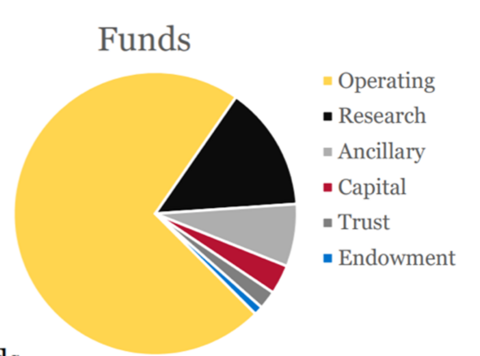
11.4.1 Operating Fund
This is an unrestricted fund used to manage general operations of the University.
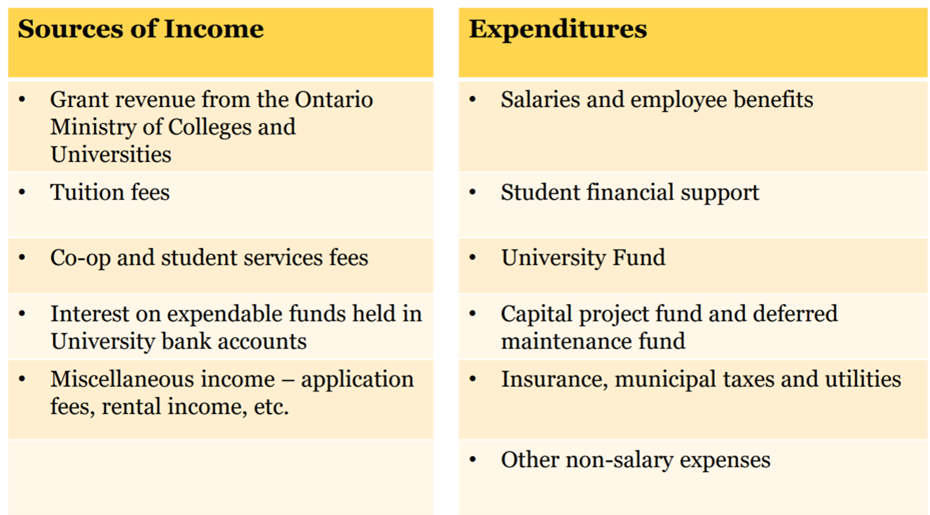
11.4.2 Research Funds
The Research Fund is a restricted fund to manage grant and contract revenue received for research activities. The University must ensure funds are spent according to the terms of the research agreement.
Federal granting agencies (NSERC, CIHR, and SSHRC) provide for direct costs of research (eg., salaries, supplies, equipment) and provide funding to help offset indirect costs of research through a multi-year commitment.
11.4.3 Ancillary Funds
Ancillary Funds are used to manage operations for various services on campus such as: Campus Housing, Print + Retail Solutions, food Services, Parking and WatCard. Ancillary unit revenues fund the expenses of running their operations, and the units set aside funds for significant future costs such as capital projects and renovations.
11.4.5 Trust and Endowment Funds
These are restricted funds to support scholarships, Chairs, student activities or other activities as agreed upon by the donor.
Trust funds include donations intended to be fully spent for a purpose designated by the donor and also includes grants to be used for specific purposes.
Endowment contributions (principal) must be permanently maintained. A spending rate is set each year and is funded by the investment income earned by the endowments. Additional portion of the investment income is used to grow the principal balance.
11.4.6 Capital Fund
The Capital Fund is a restricted fund used to manage major construction, renovations and facility renewal projects. Funds for these purposes include:
- MCU provides annual grant funding to support building repairs, maintenance and alterations. Strict guidelines apply and projects must be submitted to MCU for pre-approval
- Donations
- Other special government grants for capital programs
- Transfers from the operating fund
11.5 University Administration
Governance of the University is balanced between the Board and the Senate and flows through the President’s Office to the portfolios of the Vice-Presidents, an important component of Waterloo’s governance framework known as ‘the Administration.’
The Board of Governors establishes operational policies within which the Administration operates. The execution of policies (as approved by the Board) is monitored by the Board through a variety of formal and informal reports from the Administration on the affairs of the institution.
Overview of Faculties
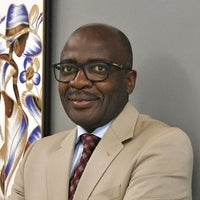
Alexie Tcheuyap - Dean, Faculty of Arts
The Faculty of Arts is one of Waterloo’s larger faculties with a diverse range of scholarship and programs in the humanities, social sciences and creative arts. Arts leads Waterloo’s top ranking for SSHRC grant success and has the most Distinguished Teaching Awards. Senior scholars in Arts hold top honours including the Killam Prize, Order of Canada and Royal Society of Canada fellowships.

Lili Liu - Dean, Faculty of Health
The Faculty of Health is a leader in the development of strategies that prevent disease and injury, protect and promote healthy living, optimize physical ability and improve well-being across the life course. The Faculty comprises three academic units: School of Public Health and Health Systems, Kinesiology, and Recreation and Leisure Studies.

Mary Wells - Dean, Faculty of Engineering
Waterloo is the largest engineering school in Canada. Waterloo Engineering’s reputation for excellence is built on the foundation of co-op education, dedication to transformational research and an unmatched culture of entrepreneurship.

Bruce Frayne - Dean, Faculty of Environment
As the largest faculty of its kind in Canada, the Faculty of Environment offers interdisciplinary programs and supports research to create the sustainable solutions needed to address the complex environmental challenges facing our world. The Faculty’s newest building EV3 was the first LEED® (Leadership in Energy and Environmental Design) Platinum certified building on an Ontario campus.

Mark Giesbrecht - Dean, Faculty of Mathematics
Waterloo is home to North America’s only dedicated Faculty of Mathematics. The Faculty is also home to the Centre for Education in Mathematics and Computing (CEMC), an outreach organization focused on providing resources for teachers and students with the goal of increasing confidence and ability in mathematics.

Chris Houser - Dean, Faculty of Science
The Faculty of Science is a research leader nationally and internationally, including Nobel Laureate Donna Strickland. Rooted in the core scientific disciplines and fundamental science research, Science also includes two professional schools: the School of Pharmacy, the only co-op pharmacy program in Canada, and the School of Optometry and Vision Science, Canada’s only English-speaking optometry program with clinics open to the community to provide patient care and support clinical education and research.
11.7 Affiliated and Federated Institutions of Waterloo
There are three affiliated and one federated institution at the University of Waterloo. The establishment of these institutions came from Christian religious groups, though not all maintain the original religious affiliation. An affiliated college or federated university is an educational institution affiliated with a University but not maintained or administered by it. They each have their own Boards and governance structures.
The affiliated colleges do not receive direct operating or capital grants from the province but share in the University’s tuition and grant revenue in exchange for its delivery of approved academic programming.
Students of the affiliated and federated institutions receive degrees from the University of Waterloo.
11.8 University of Waterloo Campuses
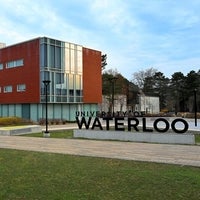
Waterloo Campus
The University of Waterloo is located in the heart of Canada’s technology hub.
-
42,000 full and part-time students (undergraduate and graduate)
-
#1 Most Innovative University in Canada (Maclean’s 2023)
-
Canada’s Largest Co-op Program
-
238,000+ Alumni in 153 countries (2022)
Take a virtual tour

Cambridge Campus
Waterloo’s School of Architecture is a nationally and internationally respected design school. It attracts top students and is dedicated to education the best architects in the world. The school is situated along the banks of the Grand River in Cambridge.
Take a virtual tour
The school also has a satellite campus in Rome.
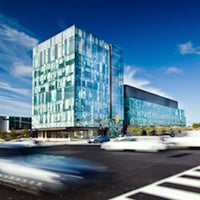
Kitchener Campus
The School of Pharmacy at the University of Waterloo is Canada’s only co-operative education pharmacy program and is housed in a state-of-the-art education and research building on the Health Sciences Campus in downtown Kitchener.
The University is currently developing the Innovation Arena in the City of Kitchener’s Innovation District. With Velocity at its core, this purpose-built facility will offer unparalleled opportunities and pathways for businesses to fast-track delivery of health technologies and support social and economic prosperity in Canada.

Stratford Campus
Waterloo’s Stratford School of Interaction Design and Business, located near downtown, offers undergraduate and graduate programs in digital arts and design within a global business framework. Unlike traditional learning spaces the building has an open-concept design.
Take a virtual tour








